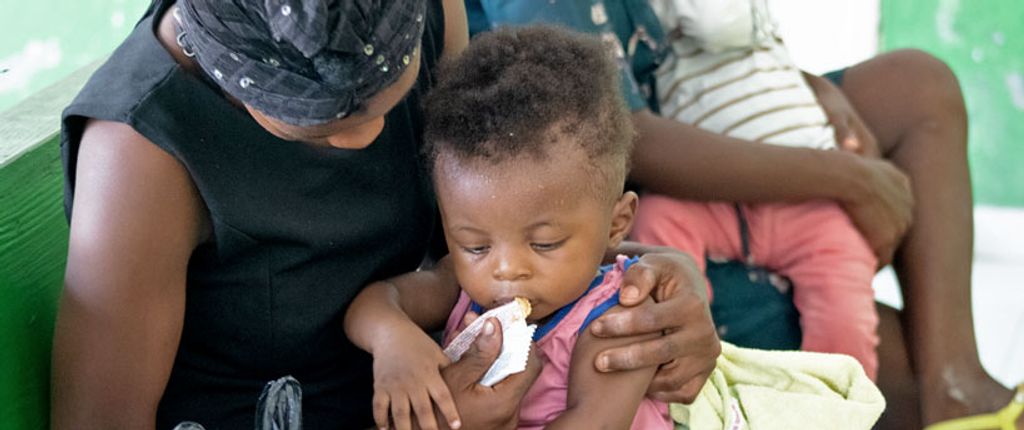
Nutrition and food security
More than 45% of Haiti's population faces acute food insecurity, and UNICEF reports that one in four Haitian children suffers from life-threatening malnutrition. The food crisis is intricately linked to natural disasters as well as political, economic, and social factors. Ongoing droughts, hurricanes, inflation, high food prices, and socio-political instability have worsened food security in recent years.
In partnership with local organizations, Malteser International aids households in underserved urban slums and rural areas in the Nippes and West departments that face food insecurity, with a focus on children under five and pregnant or breastfeeding women. The goal is to meet immediate food needs and, over time, enhance access to food in these communities to improve overall health outcomes.
Approximately 90% of Haitians live in poverty. According to the Integrated Food Security Phase Classification (IPC), over 45% of Haiti's population experiences acute food insecurity, manifesting in malnourishment and undernourishment. Outdated agricultural practices, limited water access, inadequate infrastructure, and environmental destruction caused by natural disasters contribute to insufficient food production. To bridge the gap, the country relies heavily on imports of agricultural and processed goods, including staples such as rice, maize, beans, and cooking oil. This reliance has driven up food prices, placing food out of reach for many households.
Haiti's ongoing socio-political crisis, marked by extreme gang violence and resulting in significant internal displacement, compounds income insecurity and worsens the situation. Limited access to food leads to chronic malnutrition in nearly one in four children, hindering their physical and cognitive development. This can cause stunted growth, developmental disorders, weakened immunity, and irreversible cognitive impairment. The situation is further exacerbated by inadequate access to clean water and medical care, trapping many in a cycle of disease and deprivation.
- Improving the health of children under five and pregnant or breastfeeding women.
- Increasing access to medical care for young children and women affected by malnutrition.
- Providing better access to food and water for everyday needs and agricultural purposes.
- Reducing vulnerability to food crises and bolstering food security for the target group.
- Raising awareness about the significance of a balanced diet.
- Expanding local production capabilities and promoting income-generating opportunities.
In collaboration with the affected communities and the organization AHAAMES, we focus on nutrition and health initiatives for vulnerable infants and women through the following activities:
- Identifying malnutrition in partnership with community health centers and providing essential medicines and nutritional supplements to the target group.
- Training parents in the diagnosis and management of infant malnutrition with guidance from clinic staff.
- Building sustainable capacity among local partners and healthcare providers.
- Providing cash transfers to households impacted by food shortages.
- Training the target group in the creation of family and community gardens, implementing sustainable agricultural practices, and enhancing irrigation and water storage capacities.
- Supplying and instructing the community in the use of agricultural tools and equipment, as well as raising and caring for farm animals.
- Promoting income-generating opportunities for low-income families.
- Facilitating knowledge transfer among participants to strengthen community resilience.
- Supporting smallholder households in adapting to climate change effects and promoting sustainable agricultural practices.
- Increasing awareness of balanced nutrition, preventive healthcare, and hygiene practices through campaigns and public networks.
Country info
Captial: Port-au-Prince
Area: 27,750 km²
Population: approx. 11.5 million
Project data
Donors: Federal Foreign Office (AA), Federal Ministry for Economic Cooperation and Development (BMZ)
Partner: AHAAMES








